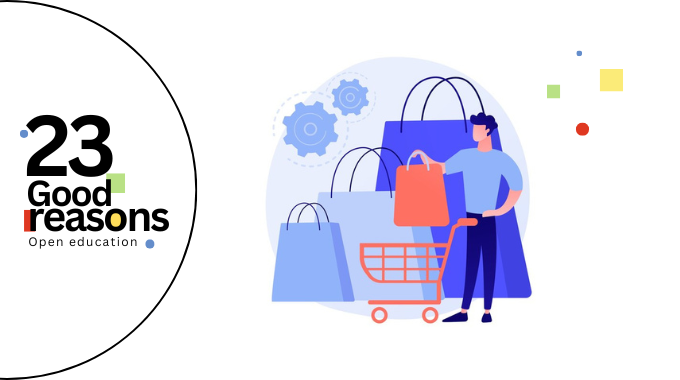
Open education and Open Educational Resources (OER) to control the commercialization of education
Author
Catherine Lachaîne is Interim Head, Collections Strategy at the University of Ottawa Library. A doctoral student in education, she is also Scientific Coordinator of the Research Chair on the Digital Vitality of Franco-Ontarian Communities and Visiting Program Officer for Open Education at the Canadian Association of Research Libraries.
The knowledge economy is lucrative for those who know how to play the game. New strategies are emerging all the time on the part of information companies and publishers to control the education and research market, even using open washing to achieve this.
« Inclusive access » and « equitable access » programmes
In North America, automatic textbook billing models are being promoted as inclusive and equitable alternatives for access to educational materials. The use of vocabulary borrowed from open education is misleading and cannot be considered accidental with the rise in popularity of OER. There are many issues at stake in these models and it is important to understand what we are talking about. Inclusive access programmes offer a textbook sales model integrated with tuition fees1. Once implemented, this commercial arrangement between suppliers and the educational institution (often through the campus bookshop) is imposed on the entire student body. If possible, the onus is on the student to withdraw from the programme if they do not want to be billed automatically and wish to obtain the course materials in another way2. This is an unnecessary additional burden and an attack on learners’ agentivity.
Fair access programs are even more aggressive, as they impose flat fees for each course credit on all students, regardless of whether or not the course requires a textbook. Although the entire student body pays an equivalent amount for the number of credits, this unfair model for those who do not have textbooks assigned to their courses is disguised as being fair. What’s more, the textbooks and resources included in these models are digital and in most cases the student will lose access to them at the end of their course or degree. It is therefore a rental fee, rather than a perpetual purchase.
This game of open washing is even played out in the names of the programmes, which differ from campus to campus, making it difficult for students to distinguish what they are talking about. Inclusiveaccess.org compiles a list and we see the variety of terms used to describe the programmes, for example: All Access; All Inclusive; Digital Direct Access; Equitable Access; Universal Access; Immediate Access; IncludED; Inclusive Access3. These names, while positive and evocative of barrier-free access, all conceal associated costs.
In addition to these fees, there are other important issues surrounding the adoption of these models by educational institutions. In its statement on automatic textbook billing models, the Canadian Association of Research Libraries (CARL) highlights the tracking and collection of personal data on students by digital textbook suppliers. These programmes also limit the academic freedom of teaching staff, since a choice of teaching materials produced by publishers is selected and determined in advance. And no supplier can claim to offer access to all the diversity of content, especially in environments where the language of instruction is other than English. This pre-selected and standardised content does not represent the local and unique character of the countries, regions or cities where education takes place. The importance of glocalization, the adaptation of content with a global content to the local reality, which is evoked in the discourse on OER4, is completely evacuated. Finally, these models detract from library services, which offer genuinely affordable alternatives for students, through their collections and reserves of electronic courses.
Although the commercialization of education in the neoliberal context of higher education is not a recent phenomenon, these new methods of monopolising the educational publishing market are gaining ground. We must remain vigilant and ultimately resist the pressure these companies are putting on our campuses.

OER as a truly open response
One way of resisting is to continue to support OER in our institutions, this truly free and open learning material5. By continuing to invest in programmes to create and adapt OER, to offer support for their integration, to develop curricula with « Zero Textbook Cost » (ZTC), and to raise awareness in our communities of the benefits that OER brings to students, but also to teachers, we can win the joust against the industry. The open education community is dynamic and creative, and we have what it takes if we all pull together as one big team.
Please note that this article has been translated with the help of artificial intelligence and reviewed by individuals who are not professional translators. Despite our efforts to ensure accuracy and fidelity, errors or inaccuracies may remain. Feel free to let us know at: chaireunescorelia@univ-nantes.fr
References
- https://www.carl-abrc.ca/fr/publications-et-documents/declaration-de-labrc-sur-les-modeles-de-facturation-automatique-des-manuels-didactiques/ ↩︎
- https://www.inclusiveaccess.org/resources/what-is-inclusive-access ↩︎
- https://www.inclusiveaccess.org/resources/what-is-inclusive-access ↩︎
- Willems, Julie, et Carina Bossu. « Equity considerations for open educational resources in the glocalization of education ». Distance Education 33, nᵒ 2 (2012): 185‑99. https://doi.org/10.1080/01587919.2012.692051. ↩︎
- https://www.unesco.org/fr/legal-affairs/recommendation-open-educational-resources-oer ↩︎
License
This article by Catherine Lachaîne is made available under the terms of the Creative Commons Attribution 4.0 International License.

Poster un Commentaire